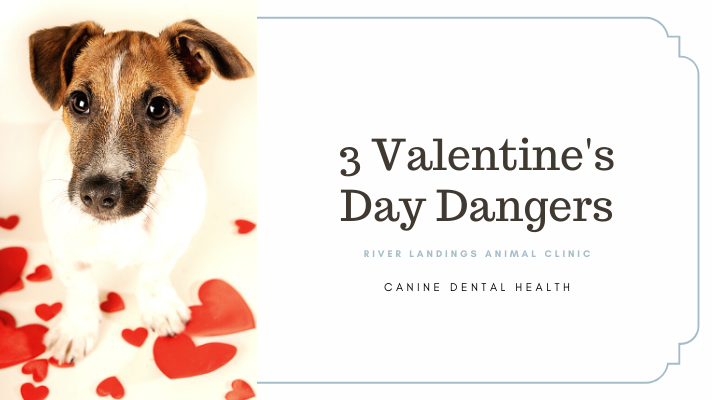A bouquet of flowers, a box of candy, and a chocolate heart. Who wouldn’t be delighted to receive any one of these treats this Valentine’s Day? But although these may be a delight for you, they may pose a hidden health risk for your dog or cat.
Sadly, chocolate, xylitol in candies, and lilies all have substances that are potentially deadly to pets. Countless dogs each year come in for chocolate toxicity, and then there are the heartbreaking cases of cats poisoned by lilies, and dogs practically in a coma from eating low-sugar candies and cookies.
Chocolate
Picture this: A rambunctious pair of Labradors, bounding into the surgery for emergency treatment.
To look at them you’d think they were in bursting good health as they bounced off the walls with even more exuberance than usual. However, a clinical examination revealed a different picture. Hearts racing dangerously fast, with the potential for them to collapse at any second. Their hyperactivity was caused by too much of a chemical from the caffeine family, theobromine, in their bloodstream.
Unfortunately, chocolate contains theobromine, an extreme stimulant to dogs. It causes a racing heart and stimulates the central nervous system. Some dogs are so sensitive to the effects that even a small amount can cause seizures and death.
Treatment involves making the dog vomit, giving diazepam to calm their central nervous systems, and administering activated charcoal by mouth every few hours to mop up the residual chocolate.
It’s possible for a full recovery, but this isn’t always the case! So, take care where you stash those chocolates.
The darker the chocolate, the more dangerous for your pet. For more information about how much chocolate is toxic, see our article on Chocolate Toxicity.
Candy Containing Xylitol
Perhaps a lesser-known threat is the risk that low-sugar candies and cookies pose to dogs.
These may contain an artificial sweetener called xylitol. Unfortunately, xylitol and dogs don’t mix. The sweetener stimulates the pancreas to produce insulin, which in turn suppresses blood sugar levels. As if that isn’t bad enough, xylitol can also cause liver damage, which results in a problem with blood clotting.
Immediate treatment is essential to saving your dog’s life. This involves an emergency trip to the veterinarian, who will administer intravenous glucose and fluids (among other things), to try to get the blood sugar levels back up to normal.
Dogs who have eaten xylitol can suffer from excessively low blood sugar levels with 60 minutes and fall into a coma. Just as those chocolates, store these candies well out of paw’s reach.
For more information about the dangers of xylitol and other toxins, read our article on pet poison prevention in the kitchen.
Lilies
Beware of Valentine’s bouquets containing lilies — specifically, the big showy ones that are so common in floral displays. (Be alert for Easter, Asiatic, Tiger, Rubrum and Day lilies, as well as any flower from the Lilium family.)
If your cat chews on the leaves or petals, drinks the water that the flowers stand in, or rubs against the pollen and grooms themselves, they are at risk of kidney failure. We don’t know why this happens, but the fact remains that lilies contain something that is deadly to cats.
Sadly, there is no cure for lily toxicity. If your cat has just ingested lily pollen, prompt veterinary attention is critical. The cat may need their stomach pumped to remove any residual contamination. Aggressive intravenous therapy can help protect the kidneys and flush the toxin, but even this is not guaranteed to be successful.
The best advice is not to allow lilies in the house (or the garden) with cats. Some people suggest cutting off the stamens (the spiky bits bearing pollen) because the most common exposure is cats who brush past the bloom, get pollen on their coat, and then groom themselves. However, to be honest, the risk just isn’t worth taking.
I hope this Valentine’s Day brings you and a loved one closer, but to avoid heartache of an altogether different sort, for the sake of your pets, take care where you put those Valentine’s gifts.


